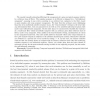Free Online Productivity Tools
i2Speak
i2Symbol
i2OCR
iTex2Img
iWeb2Print
iWeb2Shot
i2Type
iPdf2Split
iPdf2Merge
i2Bopomofo
i2Arabic
i2Style
i2Image
i2PDF
iLatex2Rtf
Sci2ools
TIT
2008
2008
How to Filter an "Individual Sequence With Feedback"
We consider causally estimating (filtering) the components of a noise-corrupted sequence relative to a reference class of filters. The noiseless sequence to be filtered is designed by a "well-informed antagonist", meaning it may evolve according to an arbitrary law, unknown to the filter, based on past noiseless and noisy sequence components. We show that this setting is more challenging than that of an individual noiseless sequence (a.k.a. the "semi-stochastic" setting) in the sense that any deterministic filter, even one guaranteed to do well on every noiseless individual sequence, fails under some well-informed antagonist. On the other hand, we constructively establish the existence of a randomized filter which successfully competes with an arbitrary given finite reference class of filters, under every antagonist. Thus, unlike in the semi-stochastic setting, randomization is crucial in the antagonist framework. Our noise model allows for channels whose noisy out...
Related Content
| Added | 15 Dec 2010 |
| Updated | 15 Dec 2010 |
| Type | Journal |
| Year | 2008 |
| Where | TIT |
| Authors | Tsachy Weissman |
Comments (0)

